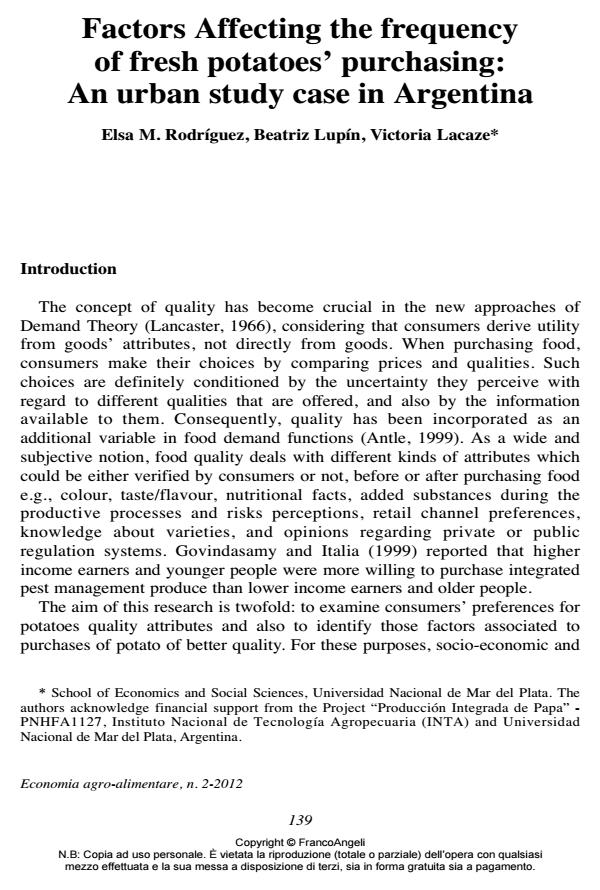Factors Affecting the frequency of fresh potatoes’ purchasing: An urban study case in Argentina
Titolo Rivista ECONOMIA AGRO-ALIMENTARE
Autori/Curatori Elsa M. Rodrìguez, Beatriz Lupìn, Victoria Lacaze
Anno di pubblicazione 2012 Fascicolo 2012/2 Lingua Italiano
Numero pagine 14 P. 139-152 Dimensione file 147 KB
DOI 10.3280/ECAG2012-002007
Il DOI è il codice a barre della proprietà intellettuale: per saperne di più
clicca qui
Qui sotto puoi vedere in anteprima la prima pagina di questo articolo.
Se questo articolo ti interessa, lo puoi acquistare (e scaricare in formato pdf) seguendo le facili indicazioni per acquistare il download credit. Acquista Download Credits per scaricare questo Articolo in formato PDF

FrancoAngeli è membro della Publishers International Linking Association, Inc (PILA)associazione indipendente e non profit per facilitare (attraverso i servizi tecnologici implementati da CrossRef.org) l’accesso degli studiosi ai contenuti digitali nelle pubblicazioni professionali e scientifiche
When purchasing food, consumers make their choices by comparing prices and qualities. As a wide and subjective notion, food quality deals with different kinds of attributes. They could be either verified by consumers or not before or after purchasing food e.g., colour, taste/flavor, nutritional facts, added substances during the productive processes, risks perceptions, and retail channel preferences. The aim of this research is to examine consumers’ preferences for fresh potatoes quality attributes and also to identify those factors associated to purchases of potato of better quality. Data come from a household survey conducted in Mar del Plata city, Argentina, in June 2009. A representative sample of the population included 500 randomly selected households. Related to potato nutrients, 50% of the sample mentioned at least one nutrient (carbohydrates 83%, vitamins 24%, potassium 16%, and fibre 12%). Households with many members have a higher probability to consume fresh potato more frequently than smaller households, and older respondents consume fresh potato more frequently than younger individuals. Households considering potato as a relevant component of a balanced diet are likely to consume fresh potatoes more frequently than households that did not emphasized the role of this product in their meals. Consumer perception about the relationship between price and quality showed that the higher educational level, the lower the number of respondents who declared that the price is a trustful sign of quality. Finally, when asked about willingness-to-pay for fresh potatoes of better quality, 34% of households were willing to pay a premium of 0.13 US$/kg and 19% were willing to pay a price premium of 0.26 US$/kg.;
Keywords:Fresh potatoes, quality attributes, perceptions, willingness-to-buy
Jel codes:D1, D12, Q13
- Tüketicilerin Patates Tüketim Tercih ve Davranışlarını Etkileyen Faktörlerin Analitik Hiyerarşi Süreci İle Tespiti: Erzurum İli Örneği Adem Aksoy, Emine İKİKAT TÜMER, in Atatürk Üniversitesi Ziraat Fakültesi Dergisi /2019 pp.122
DOI: 10.17097/ataunizfd.466262
Elsa M. Rodrìguez, Beatriz Lupìn, Victoria Lacaze, Factors Affecting the frequency of fresh potatoes’ purchasing: An urban study case in Argentina in "ECONOMIA AGRO-ALIMENTARE" 2/2012, pp 139-152, DOI: 10.3280/ECAG2012-002007